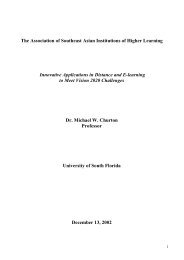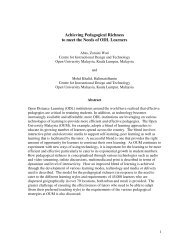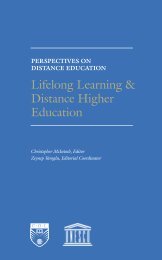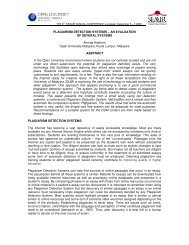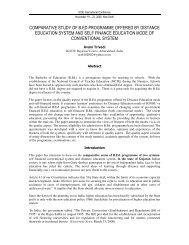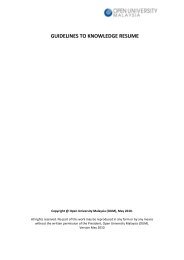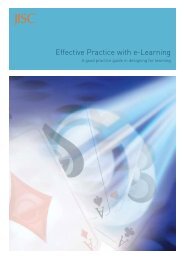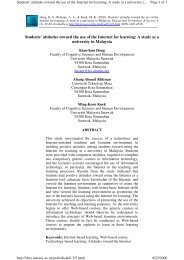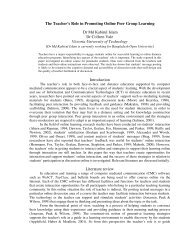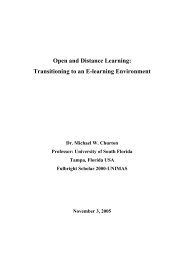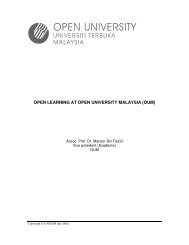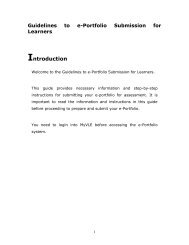e-learning readiness - Asia Pacific Region - Open University Malaysia
e-learning readiness - Asia Pacific Region - Open University Malaysia
e-learning readiness - Asia Pacific Region - Open University Malaysia
- No tags were found...
Create successful ePaper yourself
Turn your PDF publications into a flip-book with our unique Google optimized e-Paper software.
learner-centred and therefore learners need to be more proactive andresponsible when engaging in this mode of <strong>learning</strong>. It was alsohighlighted that E-<strong>learning</strong> is more suitable for non-technical subjects. Itwas observed that enablers did not refer to local content written in BahasaMelayu or any other language.Management ReadinessAs for management <strong>readiness</strong>, the most obvious finding was that 82.6percent of the enablers claimed that their organisation or institution has avision and or mission on E-<strong>learning</strong> (refer to Table 36). Besides that, 66.7percent of the enablers said that their organisation/institution hasformulated policies related to the provision of E-<strong>learning</strong> and 61.2 percentbelieved that their organisation/institution is ready for E-<strong>learning</strong>.TABLE 36. Enablers’ Perceptions of Management ReadinessDescriptionYesn(%)Non(%)Missingvaluen(%)Organisation has a807 150 20vision/mission on E-<strong>learning</strong> (82.6) (15.4) (2.0)Organisation has formulatedpolicies related to theprovision of E-LearningOrganisation recognizesqualifications obtained via E-<strong>learning</strong>Organisation is ready for E-<strong>learning</strong>652(66.7)592(60.6)598(61.2)300(30.7)323(33.1)329(33.7)25(2.6)62(6.3)50(5.1)TotalN(%)977(100)977(100)977(100)977(100)According to the qualitative data analysis, management <strong>readiness</strong> isreflected in institutional investment in E-<strong>learning</strong> programmes. Althoughsome enablers felt that institutions have a budget allocated to E-<strong>learning</strong>,it was also perceived that the lack of exposure and technical skills mayhinder the implementation of E-<strong>learning</strong> initiatives. Generally, it was feltthat co-ordination efforts, complemented by a well-planned and carefullymonitored programme would ensure greater <strong>readiness</strong>. Most enablersthought that E-<strong>learning</strong> is a positive step towards the future of educationand there would be a higher level of <strong>readiness</strong> if E-<strong>learning</strong> wereimplemented in schools for young children.Personnel ReadinessIn terms of personnel <strong>readiness</strong>, 71.5 percent of the enablers indicated thattheir organisation/institution provides technical assistance to staff andstudents. An important point to note is that over 60 percent of theenablers claimed that their organisation/institution has a central dedicatedJoint Study by MEWC and OUM 56



